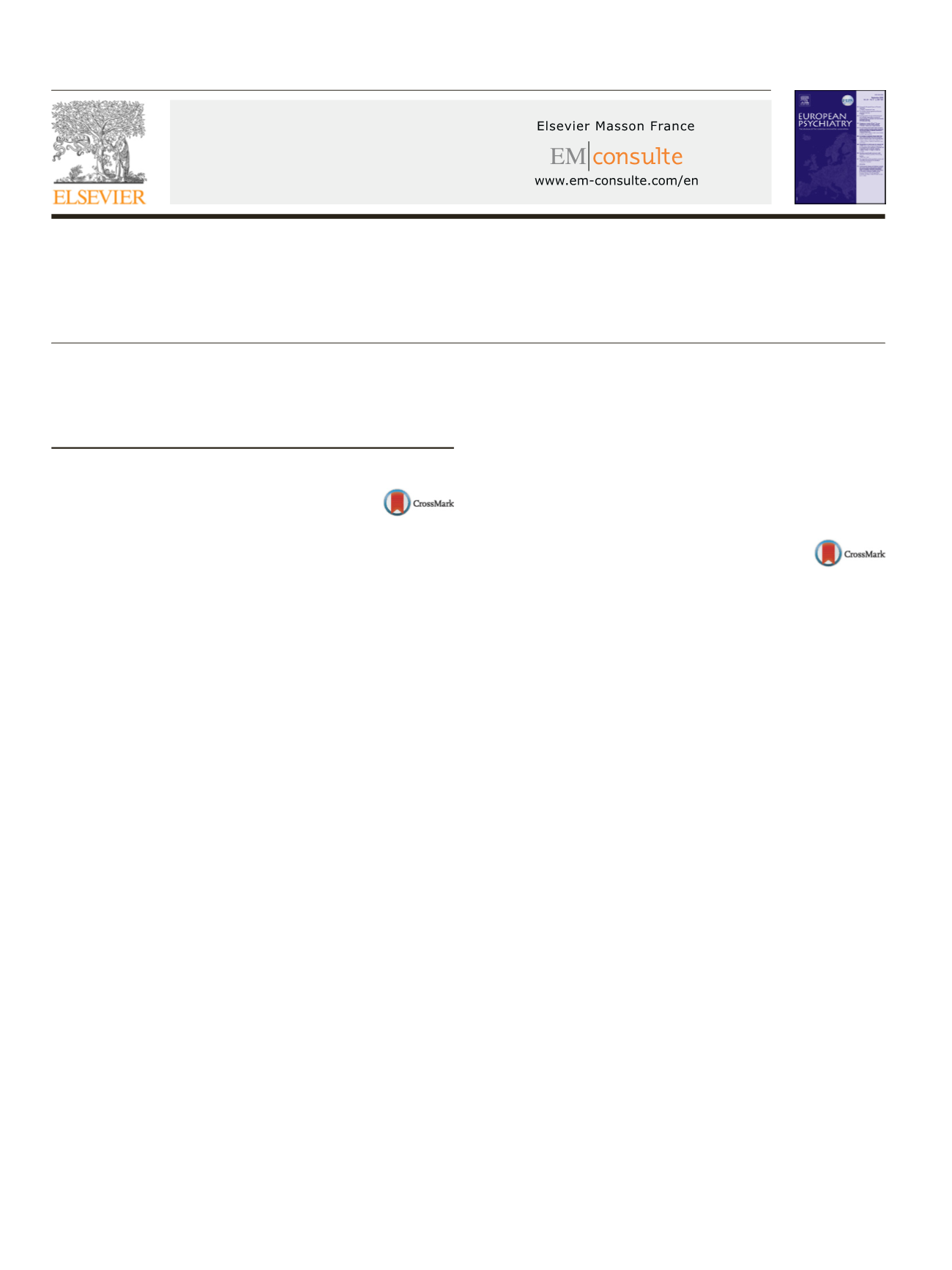
 European Psychiatry 41S (2017) S106–S169
European Psychiatry 41S (2017) S106–S169
Available online at
ScienceDirect
www.sciencedirect.com25th European Congress of Psychiatry
e-Poster Walk Part 1
e-Poster walk: Anxiety disorders and somatoform
disorders
EW0001
Fear crush: Effect of an interventional
program for elementary school
children with performance anxiety
J. Benevides
1 ,∗
, C. Barreto Carvalho
2, M.D.C. Salvador
3,
A.F. Macedo
41
Universidade dos Ac¸ ores, Psychology, Ponta Delgada, Portugal
2
University of Azores, Azores, Portugal, Cognitive and Behavioral
Center for Research and Intervention, CINEICC, Psychology, Ponta
Delgada, Portugal
3
Cognitive and Behavioral Center for Research and Intervention,
CINEICC, Faculty of Psychology and education sciences, University of
Coimbra, Psychology and education sciences, Coimbra, Portugal
4
University of Coimbra, Medical Psychology Service, Faculty of
Medicine, Coimbra, Portugal
∗
Corresponding author.
The prevalence of mental disorders in Portugal is 23%. Of these,
anxiety disorders are most prevalent. Given these data, the devel-
opment and implementation of remediate programs in general
takes urgent character, especially in the younger population,
where it is estimated that one in every five children suffer from
some mental disorder. Given the lack of intervention programs
in performance anxiety, we propose the development and imple-
mentation of a group program for elementary school children,
targeting both the improvement and possible recovery of this
condition as a means of reducing school failure in these chil-
dren. In this program the following aspects will be addressed:
the study and regulation of emotions; perceptions of self-efficacy;
and therapeutic strategies based on third generation of cogni-
tive behavior therapy–acceptance and commitment therapy. As
a non-randomized controlled study, this project involves the
development, implementation and validation of the intervention
program. To this end, an assessment protocol will be administered
to both control and experimental groups. This latter protocol will be
administered at three different times: before and after implemen-
tation of the program and as a follow-up evaluation 6 months later.
This program aims to promote emotional regulation in children
with performance anxiety and, concurrently, to improve chances
for their possible recovery as well as the reduction of significant
school failure rates among Azorean children. The implementation
of this therapeutic group intervention program with elementary
school childrenmay also prevent later interventions in other health
and educational settings.
Disclosure of interest
The authors have not supplied their decla-
ration of competing interest.
http://dx.doi.org/10.1016/j.eurpsy.2017.01.1870EW0002
Psychological interventions for
psychogenic non-epileptic seizures:
A meta-analysis
P. Carlson
Central West Neurology & Neurosurgery, Neurology, Orange,
Australia
Introduction and objective
Psychological interventions for psy-
chogenic non-epileptic seizures (PNES) show promising results.
The aim of this meta-analysis is to evaluate and synthesize the
available evidence from the previous 20 years regarding the utility
of psychological interventions in the management of PNES.
Method
Studies were retrieved from MEDLINE via OvidSP and
PsychINFO. Selection criteria included controlled and before-
after non-controlled studies including case series, using seizure
frequency as an outcome measurement. Studies were required
to assess one or more types of psychological intervention for
the treatment of PNES in adults. Data from 13 eligible studies
was pooled to examine the effectiveness of psychological inter-
ventions in treating PNES on two primary outcomes: seizure
reduction of
≥
50% and seizure freedom. A meta-analysis was
conducted with data extracted from 228 participants with
PNES.
Results
Interventions reviewed in the analysis included CBT, psy-
chodynamic therapy, paradoxical intention therapy, mindfulness,
psychoeducation and eclectic interventions. Meta-analysis synthe-
sized data from 13 studies with a total of 228 participants with
PNES, of varied gender and age. Results showed 82% of people
with PNES who complete psychotherapy experience a reduction in
seizures of
≥
50%. Additional meta-analysis synthesized data from
10 studies with a total of 137 participants with PNES. This analysis
found 47% of people with PNES are seizure free upon completion
of a psychological intervention.
Conclusion
The studies identified were diverse in nature and
quality. Findings highlight the potential for psychological inter-
ventions as a favorable alternative to the current lack of treatment
options offered to people with PNES.
0924-9338/


















